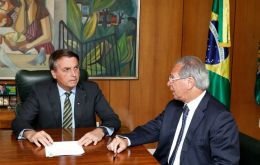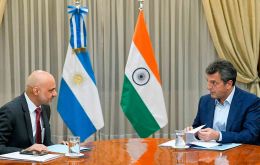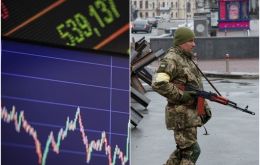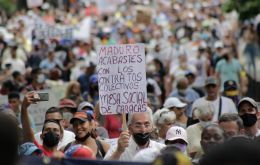MercoPress. South Atlantic News Agency
Economy
-
Wednesday, August 31st 2022 - 09:42 UTC
Brazil, US to deepen bilateral trade

Brazil and the United States have taken yet another step toward reducing non-tariff barriers in bilateral trade, it was reported Tuesday after a statement was released Tuesday in Brasilia.
-
Wednesday, August 31st 2022 - 09:33 UTC
Bolsonaro makes promises for next year

Brazil's President Jair Bolsonaro Tuesday says he would readjust the salary of civil servants in 2023, although, to do that beyond January 1, he would have to be reelected in October.
-
Tuesday, August 30th 2022 - 10:16 UTC
All fuel prices in Brazil down, thanks to Petrobras and tax reductions

A survey from Brazil's National Oil, Gas and Bio-fuels Agency, ANP, showed that the average price for a liter of gasoline in service stations across Brazil had dropped 2,77%, and this way the price is now R$ 5,25 this week, the lowest it has been since February 2021.
-
Tuesday, August 30th 2022 - 09:59 UTC
Rubinstein denies Argentina plans 50% devaluation

Argentina's Deputy Economy Minister Gabriel Rubinstein Monday denied rumors of a 50% devaluation of the local peso against the US dollar that had gone viral in Buenos Aires' financial circles.
-
Saturday, August 27th 2022 - 09:51 UTC
Federal Reserve pledges to keep lowering inflation, “until we are confident the job is done”

The chairman of the Federal Reserve, Jerome Powell said on Friday that the job of lowering inflation is not done, and “we will keep at it until we are confident the job is done”. Powell was speaking at the Fed's annual conference in Jackson Hole, Wyoming, an event closely followed by markets and pundits, trying to anticipate future actions.
-
Saturday, August 27th 2022 - 09:15 UTC
Brazil estimates a grains and oilseeds 2022/23 harvest of 308 million tons

Brazil's government CONAB, (National Supply Company) anticipated that the 2022/23 grains and oil seeds harvest would reach 308 million tons, given the good performance and strong international demand for corn, soybean, rice, beans and cotton.
-
Friday, August 26th 2022 - 18:50 UTC
Argentine Superminister Massa discusses bilateral ties with Indian FM

Argentina's Superminister Sergio Massa Friday called for the strengthening of bilateral trade with India after a meeting with Foreign Minister Subrahmanyam Jaishankar, who is touring Latin America and held an encounter Thursday with President Alberto Fernández.
-
Friday, August 26th 2022 - 10:09 UTC
Ukraine conflict, inflation, tighter monetary policy slowing down global trade, WTO quarter report

The World Trade Organization warns that uncertainty has increased as a result of the conflict in Ukraine, growing global inflation, and the predicted tightening of monetary policy by central banks in advanced nations.
-
Thursday, August 25th 2022 - 09:53 UTC
Employment grows in Uruguay after pandemic lull

Uruguay's National Statistics Institute (INE) has published its latest measurement according to which the employment rate stood at 56.8% in July of 2022, one-tenth higher than the previous month.
-
Wednesday, August 24th 2022 - 10:14 UTC
Venezuelan civil servants march against salary-deteriorating instructions

Retired and active Venezuelan civil servants marched Tuesday through the streets of Caracas to protest against the Government's policies that “are starving us to death.” They were greeted by pickets and blockades by the Bolivarian National Police (PNB) and the Bolivarian National Guard (GNB).
